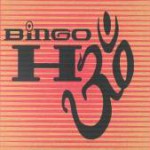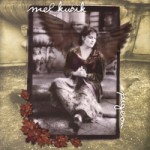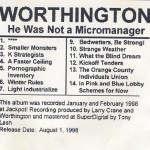 Bingo
Bingo
H-om
Undercover Records
Peripatetic Kevin Richey, who, among other things, holds down the post of banjoist and intermittent vocalist for Golden Delicious, has assembled a cast of musicians, mostly culled from the local ranks, to create a dense sound that contains folkish roots, while occasionally reaching toward a heavier comportment. Enlisting the services of drummer Clayton Jones and the equally ubiquitous bassist Tim Acott and Marilee Hord on violin, Richey delves deeply into the Folk roots to which he has become associated by the general public. These account for both ends and the middle of the album, perhaps four songs.
Around that base are constructed some very interesting sound collages that often rather dramatically push the envelope, incorporating elements of Folk and World music; as well as Electronic and Experimental aspects. While the results may challenge the purists among Richey’s audience, listeners with open ears will hear much about his recording that is new and very different.
Songs such as “Yonder Hill,” with its Bluegrass ambiance and Donovanesque melody; the straightforward Delta flavor of “Walkin’ Boss;” the porcelain delicacy of the banjo and simple piano phrasings of “Tea Song;” the Rock-tinged “Carolina” with its acoustic guitar echoes of Blue Öyster Cult— all spring from Kevin’s Folk roots, which contain Ozark simplicity, Grateful Dead harmonic paradox, Texas grit and other related materials. Richey’s rich baritone, vaguely reminiscent of Warren Zevon’s voice, nicely negotiates the vocal chores, venturing into his upper register from time to time with equal aplomb. He shows imagination in his acoustic and electric guitarwork, as well as with his banjo stylings, integrating them into unusual combinations.
“Baby Where You Been So Long” combines Hord’s violin with Acott’s bowed stand-up bass, making for a small string section back-up, lending the simple folk song a stately air. But it’s a slightly weird spin that Richey throws on the tried-and-true traditional folk song. Moreso on “Tornadoes,” where slide guitars langorously stretch against the acoustic guitar in the verses, while more jagged passages beef up the chorus and the end of the tune. The sustained, distorted guitar tone that ends the tune becomes the drone that begins the instrumental”Keening,” over which acoustic guitar and a variety of hand drums and percussion layer patterns. Richey and Hord duet a pretty, somewhat New Agey melody on acoustic guitar and violin, echoed by shimmering banjo arpeggios on the stirring turnarounds.
But, it is with “Same Old Man” that the edge on this album is truly exposed. Skittering backwards echoes of the acoustic guitar and banjo lines that commence the song, create a modal vibration, upon which Acott on bass and Anthony Saffery of Cornershop on sitar add to the texture, while Hord supplies the lead lines in the breaks. The melody in the verses recalls Quicksilver’s “Shady Grove” as well as any number of Dead tunes (circa ’67-’71).
“Sham Ba Q’Allah” again utilizes sitar and hand drum and Hord’s subdued violin, as Richey plays acoustic guitar in a similar, generically Middle Eastern, fashion. Kevin maneuvers vocally through the verses, enhancing the mood with a characteristic melody. The chorus eerily mirrors a song called “Shine,” from the late ’60s, though our young, Kansas-bred Kevin was most certainly as yet unborn at the time of its transient popularity. More likely, Richey obtained the transmission on some other plane. Whatever the case, the resemblance is rather striking. But a cool song, with a sort of World/Folk fusion that is highly unique.
The backwards version, “Halla’q Ab Mahs,” offers an interesting, somewhat Beatlesque montage. However, at full-length, its inclusion here seems a bit self-indulgent. More to the point is “Zenith Raga,” where Richey’s Bluegrass banjo meets Saffery’s sitar in a strange world where Celtic and Sanskrit are written in the blood of the ages.
In actuality, there are two entirely separate, very different albums here. On the one hand we have Kevin Richey, purveyor of traditional Folk idioms; on the other we have Richey the musical pioneer, carving out fresh turf in a land Loreena McKennit may have first discovered. Either way, you have two pretty good records, but either way you wish Kevin would have kept doing one thing or the other. For, the two divergent techniques are ultimately more contradictory than concordant.
 Mel Kubik
Mel Kubik
Pigeon
Swallowhard Records
Longtime veteran of the local club scene, keyboardist/saxist Mel Kubik has logged time with Dub Squad, Quarterflash and Loud Sistah, as well as innumerable side-jobs and frequent studiowork. With this, her first solo effort, Mel displays stalwart abilities on the piano, as well as serious vocal chops. She combines the mature emotions of Karla Bonoff and Joni Mitchell with the emotiveness of Tori Amos, for a tightly woven presentation of eleven well-constructed songs. But, as is clearly demonstrated on the beboppish instrumental “My Dearest Wormwood,” Mel can outplay all three of the aforementioned with one hand tied behind her back.
And it’s pretty much a who’s-who of local glitterati backing Kubik from track to track, nearly all of whom she has worked with previously, at one time or another. Drummers Gregg Williams and Carlton Jackson, percussionist Brian Davis and bassist John Wager, guitarists Steve Hale, Lenny Rancher and Doug Frasier, violinist Skip Parente and vocalist Nicole Campbell, as well as a host of other first-rate musicians, make appearances.
The material is all over the board stylistically, from the Emmylou-like Country of “Don’t Mistake Me For An Angel,” to the Raittish”Slow Freight Train;” from the Latin-infused “Big Red Barn,” to the gymnopedie of “Try To Be Still.” All are played with sterling precision and pristine expertise.
But Kubik scores her best marks with the more challenging aspects found in the string-laden charts of “I Carry Your Heart” and “Blue” and the bold stride of “What Does It Matter.” The latter cooks from the heat of Kubik’s familiar chord-progression and Doug Fasier’s impeccable guitar turns over Carlton Jackson’s sledgehammer beat. Mel performs the vocal with passion and panache.
On “I Carry Your Heart,” she leaps wide intervals in a single uvular bound, augmented by Campbell and Gavin Bondy, as aggressive strings march across the choruses. Wager’s piquant bass figure and Kubik’s roiling chords neatly fill the spaces in the verses of a world class presentation. “Blue” calls to mind the winsome romances of Kate Bush’s early period in the late ’70s. A beautiful melody cascades against elegant piano filigrees and majestic flashes of Wagers’ acoustic bass and accents of strings and brass. Very pretty.
Kubik’s solo performance on “Little Bird” is a standout. And “Slow Freight Train” is well-tendered. But “Tie Up the Line” is uninteresting, despite some fine individual moments. Likewise, “Big Red Barn” seems to lack much of a point. Both are light, “story” songs with fairly predictable plots.
It’s a non pareil affair that doesn’t quite live up to the promise of the first four songs. At times it all sounds like the well-hewn demos of a songwriter shopping her wares. But half the time, Mel Kubik demonstrates exceptional talents as a singer, a songwriter and a pianist. If she were to concentrate her efforts towards a more specific sound, especially that found in the first third of her album, she would certainly heighten her chances of achieving success.
 Worthington
Worthington
He Was Not A Micromanager
Self-Produced
When Worthington first blew onto the local scene in early 1997, with their eponymously titled debut EP, the critics (including this one) fell all over themselves, babbling superlatives about the arcane band that seemed to have sprung from some strange traditional English music revival. Sort of Fairport-period Richard Thompson meets They Might Be Giants. With this, their second outing, it was of some interest to discover how they may have forged their influences in the ensuing year and a half.
It is my pleasure to report that Worthington have matured nicely in that time, incorporating new elements, utilizing their abilities in new and exciting ways; creating a really wonderful album. What is most readily apparent is their move toward a heavier, rockier sound. Secondly, it would seem that the boys in Worthington got a big dose of Radiohead in the interim. Inventive instrumentation, ingenious songs and impassioned presentations and a strange sense of coherency make of this one of the best releases of 1998. Why there are even several songs that exceed three minutes in length, several that extend to four and five minutes! In itself, that is quite an achievement for Worthington.
Vocalist Kurt Foster is in fine form throughout, his assured baritone navigating the tough, sinewy arrangements set forth by guitarists Omar Ferrari and Jake Stebner, bassist Michael Williams and drummer Oren Williams. The songs, though idiosyncratic and at times downright weird from a lyrical standpoint, are full of more hooks than Moby Dick.
The first gem “Smaller Monsters,” combines a haunting piano figure and guttural guitar utterances with Foster’s forlorn voice, to yield a lovely, yearning song that rings incongruously in the memory like a half-remembered dream. Typically elliptical lyrics decorate the extended guitar jam that is “K Strategists.” “The prince of lost charts/A seller of snow.” Oren Williams’ whipcracking beat propels “A Faster Ceiling,” as Ferrari and Stebner interweave riffs in intricate layers, Foster wailing feverish poetry just beneath the surface of the onslaught.
“Winter Rules” evolves under analogous circumstances, the guitars boiling robustly in a thick soup, as Foster petitions: “Honey I’m pulling the pin/Zero. Spin zero. Spin.” The anonymous eighth track is a big beat romp, with instrumental similarities to some of Bob Gould’s work. “Bedwetters Be Strong” has its roots in They Might Be Giants ground, an anthem for the bladder-impaired.
Perhaps a continuation of “The Girl Who Chewed Loudly,” a tune on the first album, “What The Blind Dream” would appear to refer to the hookline in the previous number, although obscure lyrics such as “Skyfulls of Christmas/Holy hands, it’s meniscus time/Hear the drivers try to think/the lights to green/Roll out the bigger guns,” are of no help whatsoever in attempting to ascertain this particular aspect.
“Kickoff Tenders” could be the work of Robyn Hitchcock in one of his more upbeat of moods, a swaggering strut that drives the ominously ascerbic lyrics— a faint scene of murder and mayhem in the heartland. The delicately beautiful “In Pink And Blue Lobby Schemes For Now” resonates with the gorgeous simplicity of Brian Wilson’s mad “Sunflower/Smiley Smile” period.
Worthington have crafted quite a serious piece of work here. Impenetrably poetic lyrics, passionately purveyed, play against smoldering instrumental washes, bursting into flame at the sheer intensity of their own friction. There are no criticisms to be leveled, no advice or admonishments to be dispensed. This is, simply, a great album, infused with the sort of wild energy and savant musicality that is so rarely encountered, but so wondrous to behold.
 Nine Volt Mile
Nine Volt Mile
Nine Volt Mile
Empire Drive Records
Nine Volt Mile provide a polished set of six strong songs that showcase Jason Lee Elliott’s powerful vocal abilities and the adept lead guitar proficiencies of Dirk Sullivan, who first made a name for himself with Love On Ice. The material is well-written Grunge/Pop with a gritty edge. Clean and razor sharp, with no sonic litter and miles of dynamic space. The journeyman rhythm section of Don Schwarz on bass and Sean Moultrie on drums makes of the quartet something of an all-star team.
“45 Degrees” builds upon sparse guitar delineation’s in the verses before exploding into a memorable hookline that elicit thoughts of angles and temperatures, while scrutinizing the misery of bad love. Elliott’s supple vocal apparatus navigates around the jagged rock of the chorus like a rubber raft, bouncing elastically upon the sonic waves. A winning number.
Moultrie’s hand drums give way to jungle toms over which Schwarz lays a moaning bassline, on the darkly forbidding ballad, “Slip Away.” A sinister, chromatic chord progression adds to the sense of foreboding on “Cut My Mouth,” before sliding into the controlled burn of the fiery chorus: Elliott’s leathery voice strops the lyrics to finely honed precision, cutting straight to the bone of the song, exposing raw tissue and nerves. Another inspired effort.
Of the remaining three entries, “Rocketship, ” with its gnarled guitar tendrils in the chorus is the most noteworthy. “She Don’t Mind” seems a bit disjointed and “Levitation Blues,” though well-executed, seems pedestrian in comparison to the best songs. Most bands would be happy with material of this caliber, but Nine Volt Mile can do better.
Somewhere in the world there is a record label that desperately needs the high level of proficiency that Nine Volt Mile bring to the table. They have their own, identifiable sound, while exhibiting a knack for constructing high quality songs. This is radio-friendly stuff that is obviously the work of seasoned professionals.
 Blue Lips
Blue Lips
Sometimes
Self-Produced
An enterprising trio, Blue Lips incorporate components of Hip Hop, Psychedelia, work-booted alternafolk and plaid-shirted alternarock and jack-booted storm-metal, in various degrees into their performance, with enough imagination and initiative to command attention. While things are a little loose around the edges, the heart is in the right place.
While guitarist Jeffrey Fuller’s snide vocal delivery on “Hang Me” might bring to mind the work of the UK’s EMF, the Violent Femmes’ Gordon Gano seems to be a distinct influence on ” Plastic Stars” and “Windows.” But the pretty ballad “Wyoming,” stands on its own, with a simple piano figure floating through the charming chorus. Fuller’s guitar solo, with little backwards bits percolating underneath, seems particularly inspired.
“Teenage Wasteland” rocks with Replacements-like authority, over Fuller’s animated guitar machinations and raucous vocals, as bassist Caleb Spiegel and drummer Dano Capristo push into overdrive. Spiegel’s lank and loose bass figure gives way to Fuller’s craggy guitars on “Firecrackers,” suggesting the rage of early Midnight Oil. “Nameless” strides upon Capristo’s relentless timpani, before erupting briefly near the end of the song. The decided crunch of “Further” owes a nod of gratitude to the influence of Frank Black.
Bluelips have yet to fully develop as an independent musical entity. But, for the most part, they have good ideas and a sense of what they want to do with their material. Another year or two spent perfecting their skills and tightening their focus could reap for them great rewards.
